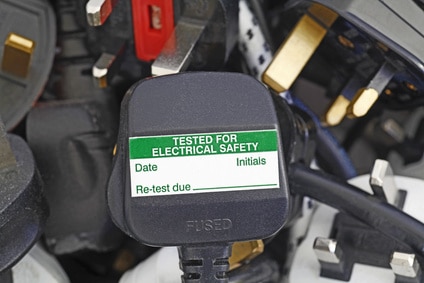New Private Rented Sector Electrical Safety Standards Explained
Property management companies across England are talking about the new electrical safety standards introduced on 1 July 2020. Here we explain what’s involved in the new Regulations, and the latest obligations residential landlords face when it comes to electrical safety.
Property management services companies across England are talking about the new electrical safety standards that were introduced on 1 July 2020. Here we explain what’s involved in the new Regulations, and the latest obligations residential landlords face when it comes to electrical safety.
Many landlords are dedicated to providing their tenants with good quality, safe places in which to live. This is why, according to the NRLA, more than 75 per cent of landlords voluntarily engage a qualified tradesperson to undertake an inspection of all the electrical installations in their properties, despite the fact that up until very recently, there was no legal obligation to do so.
However, from 1 July 2020, the rules surrounding electrical safety standards in the private rented sector in England changed. New standards have been introduced, together with a legal obligation to provide testing documentation.
The Electrical Safety Standards in the Private Rented Sector (England) Regulations 2020 place an ongoing duty on residential landlords in England to maintain their properties to the given standards, and to provide evidence that they are compliant.
In summary, all privately rented properties must meet the 18th Edition of the Wiring Regulations (British Standard 7671), with a report, known as an Electrical Installation Condition Report or EICR, made available to prove as such. This report must be provided by a suitably qualified individual. Let’s take a look at the requirements of the new Regulations in more detail.
What do the Electrical Safety Standards in the Private Rented Sector Regulations require?
Under the Electrical Safety Standards Regulations, residential landlords have a duty to:
- Ensure national standards for electrical safety are adhered to (18th Edition British Standard 7671)
- Make sure that all electrical installations in the property are inspected and tested by a suitably qualified and competent person every five years.
- Obtain a report (EICR) setting out the results of the inspection and testing and documenting a date for the next inspection and test.
- Provide a copy of the report to the existing tenant within 28 days of the inspection and test.
- Provide a copy of the report to a new tenant in advance of the start of their tenancy.
- Provide a copy of the report to any prospective tenant within 28 days of receiving a request for the report.
- Provide a copy of the report to the local authority within seven days of receiving a request for a copy.
- Retain a copy of the report to give to the inspector and tester who is engaged to carry out the next inspection and test.
- In the event that the report shows that remedial or further investigative work is required, complete this work within a maximum of 28 days, or within a shorter period should one be stated as required within the report.
- Supply written confirmation of the completion of the remedial works to the tenant and the local authority within 28 days of the works being completed.
What properties do the Electrical Safety Regulations cover? Property management services experts explain.
Any property being let in England where the tenancy was entered into on or after 1 June (when the Regulations became law) will need to have an electrical inspection and report from 1 July 2020. For existing tenancies, the inspection must be carried out and the report provided before 1 April 2021.
The Regulations cover all assured shorthold tenancies and licences to occupy. There are however some exceptions which include:
- Social housing
- Lodgers
- Tenants on a long lease of seven or more years
- Student halls of residence
- Refuges and hostels
- Care homes, hospitals and hospices
- Any other healthcare related accommodation.
Houses in multiple occupation (HMOs) were previously covered by the Management of Houses in Multiple Occupation (England) Regulations 2006. However, with the introduction of the new Electrical Safety Regulations, this has now been superseded. So HMOs are also covered by this legislation. In addition, the Housing Act 2004 has been amended by these Regulations so that there is a new obligatory condition in HMO licences ensuring every electrical installation in the property is in good working order and safe for ongoing use. Read the Government’s guidance on HMO licences to learn more.
Where can I find more information on the new Electrical Safety Regulations?
What constitutes a qualified and competent person for the inspection and testing, how to find one and what will be inspected and tested are all covered in this Government guidance. The guidance also outlines what happens during the inspection and provides more detail on what the Electrical Installation Condition Report (EICR) will show. There is also a section covering remedial work, and what to do if the report recommends that action is taken to make any electrical installations in the property safe.
Property management services experts are warning landlords that any breach of their new duties under the Regulations could result in the local authority imposing a financial penalty of up to £30,000. It is therefore vital that as a landlord, you take these new changes in the law very seriously. If you are time poor as so many landlords understandably are, why not hand over to any of the local property management companies that come highly recommended to take care of regulatory compliance on your behalf?
For property management services that help you stay legally compliant, talk to homes2let
When it comes to property management, London landlords have trusted homes2let for several years. Our objective is to leave you as a landlord with zero stress, whilst optimising your bottom line. Taking care of all your legal compliance issues is one of our areas of expertise. And that’s not all we can help you with.
Why not take a look at our guaranteed rent scheme to find out how we can secure your rental income and eliminate void periods at the same time?
Related Insights

Garden Maintenance: Landlord or Tenant Responsibility?
As the weather finally starts to break, and thoughts turn to getting back outside, the question of who is responsible for what in terms of garden maintenance naturally rears its head. It is vital for landlords to know where they stand in this respect. Read on as we reveal who must be doing what in the garden, and where tenants stand on their rights to make changes.

Attracting Millennials to Your Rental Apartment – Our Guide
If you are a landlord with property to let in London, millennials could well be an ideal audience for you. Here are our top tips to help you attract this demographic to your rental apartment.

Government Confirms Major Leasehold Changes on the Horizon
Significant changes to English property law and specifically leasehold legislation are set to be introduced as the Government is poised to radically overhaul the system, making it easier and less costly for landlords and property owners to extend leases or convert them to freehold or commonhold in the future.







